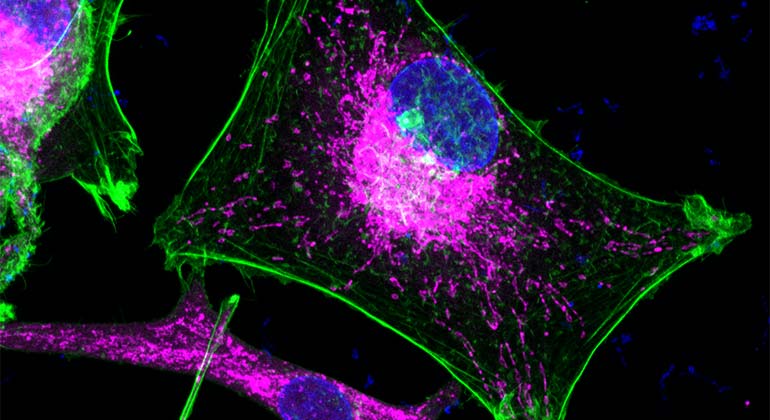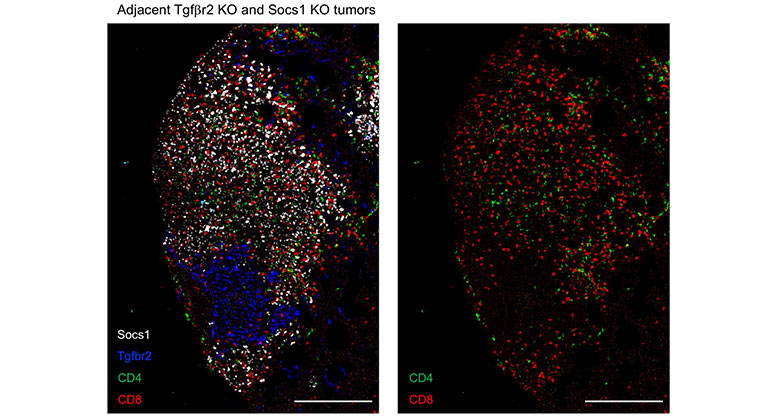Mount Sinai Genetic Testing Laboratory Launches More Accurate Carrier Screening Test for Spinal Muscular Atrophy
Use of genetic variants improves detection of SMA carriers in clinical test that will be broadly licensed to testing labs worldwide.
The Icahn School of Medicine at Mount Sinai today announced the launch of a more accurate carrier screening test for spinal muscular atrophy (SMA), one of the most common and severe autosomal recessive disorders. This new test will help prospective parents more effectively identify whether they carry the mutation that will affect their offspring. The test screens for genetic variation discovered by Mount Sinai researchers, which has been demonstrated to identify silent carriers of SMA in certain populations with higher accuracy and offers more accurate risk estimates than existing tests in all ethnic groups tested. Mount Sinai will be licensing the new test to other clinical laboratories to facilitate access to more accurate SMA carrier screening for as many people as possible.
SMA is an autosomal recessive disease that affects about 1 in 10,000 people and is one of the most deadly genetic diseases among infants and toddlers. It is transmitted by carrier parents who have no symptoms themselves; as many as 1 in 35 people may carry an SMN1 gene mutation, which is the gene that is defective in SMA. The disease kills nerve cells in the spinal cord, causing progressive degeneration among patients and diminishing capacity for walking, breathing, and swallowing. Severe forms of SMA are fatal, and there is currently no cure for the disease.
Scientists at the Mount Sinai Genetic Testing Laboratory recently used next-generation DNA sequencing to discover a new SMN1 genetic pattern that more accurately predicts the risk of having children with this disease. Current SMA carrier screening tests may result in false negative results due to their inability to detect silent carriers with two copies of the SMN1 gene on one chromosome and no copies on the other. The Mount Sinai Genetic Testing Laboratory's patent-pending enhanced SMA test identifies a novel haplotype that successfully distinguishes those duplicated genes. This work, which was conducted by Mount Sinai scientists and published in Genetics in Medicine in June 2013, significantly improves detection rates in the Ashkenazi Jewish population and improves risk estimates after a negative carrier screen for SMA in all ethnic groups.
"People who choose to undergo carrier screening for spinal muscular atrophy do so to ensure that their future children will not suffer from this debilitating disease. It is important to provide patients with the most accurate risk estimates possible," said Lisa Edelmann, PhD, Director of the Mount Sinai Genetic Testing Laboratory. "Launching this enhanced test based on our recent scientific findings on SMN1 will provide more meaningful answers to these prospective parents, and it can also provide new information to people who have previously been screened with existing SMA carrier tests."
The new test will be performed by the Genetic Testing Laboratory for all patients undergoing carrier screening for SMA. In addition, Mount Sinai will actively license the test to as many third-party clinical laboratories as possible.
"This enhanced SMA carrier screening test shows the tremendous value in Mount Sinai’s approach to translational research," said Robert Desnick, MD, PhD, Dean for Genetics and Genomic Medicine, Professor and Chairman Emeritus of Genetics and Genomic Sciences at the Icahn School of Medicine at Mount Sinai. "What began as a basic research project to identify founder alleles for Ashkenazi Jewish SMA carriers has resulted in a test that outperforms existing screening methods and offers real clinical benefit to the hundreds of thousands of people who will be screened by Mount Sinai or any of our licensees around the world."
About the Mount Sinai Health System
Mount Sinai Health System is one of the largest academic medical systems in the New York metro area, with more than 43,000 employees working across eight hospitals, over 400 outpatient practices, nearly 300 labs, a school of nursing, and a leading school of medicine and graduate education. Mount Sinai advances health for all people, everywhere, by taking on the most complex health care challenges of our time — discovering and applying new scientific learning and knowledge; developing safer, more effective treatments; educating the next generation of medical leaders and innovators; and supporting local communities by delivering high-quality care to all who need it.
Through the integration of its hospitals, labs, and schools, Mount Sinai offers comprehensive health care solutions from birth through geriatrics, leveraging innovative approaches such as artificial intelligence and informatics while keeping patients’ medical and emotional needs at the center of all treatment. The Health System includes approximately 7,300 primary and specialty care physicians; 13 joint-venture outpatient surgery centers throughout the five boroughs of New York City, Westchester, Long Island, and Florida; and more than 30 affiliated community health centers. We are consistently ranked by U.S. News & World Report's Best Hospitals, receiving high "Honor Roll" status, and are highly ranked: No. 1 in Geriatrics and top 20 in Cardiology/Heart Surgery, Diabetes/Endocrinology, Gastroenterology/GI Surgery, Neurology/Neurosurgery, Orthopedics, Pulmonology/Lung Surgery, Rehabilitation, and Urology. New York Eye and Ear Infirmary of Mount Sinai is ranked No. 12 in Ophthalmology. U.S. News & World Report’s “Best Children’s Hospitals” ranks Mount Sinai Kravis Children's Hospital among the country’s best in several pediatric specialties.
For more information, visit https://www.mountsinai.org or find Mount Sinai on Facebook, Twitter and YouTube.

Targeting One Type of Immune Cell With Another Slows Cancer Growth in Preclinical Studies
Oct 25, 2022 View All Press Releases
Novel CRISPR Imaging Technology Reveals Genes Controlling Tumor Immunity
Mar 15, 2022 View All Press ReleasesMount Sinai Researchers: Why COVID-19 May Be Less Common in Children Than Adults
May 22, 2020 View All Press ReleasesMount Sinai Researchers Identify 20 Novel Gene Associations With Bipolar Disorder
May 01, 2019 View All Press Releases
Mount Sinai and IBM Researchers Uncover Key to Greater Efficacy in Cancer Treatment
Mar 21, 2019 View All Press Releases

